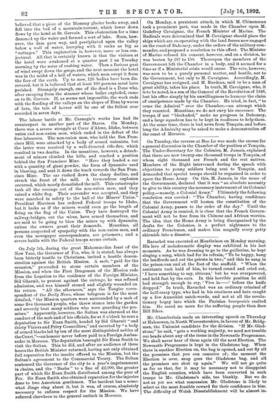On July 5th, daring the great Mahommedan feast of the
New Year, the Governor of Fez, who, it is stated, has always been bitterly hostile to Christians, incited a hostile demon- stration against the British Mission. A mob, " paid for the occasion," proceeded to stone certain members of the Mission, and when the First Dragoman of the Mission rode from the Legation to the residence of the Foreign Minister, Sid Gharnit, to protest against the outrage, he was refused admission, and was himself stoned and slightly wounded on his return. "All the afternoon," says the Tangier corre- spondent of the Daily News, whose telegram is far the most detailed, " the Mission quarters were surrounded by a mob of some five thousand people, who threw stones into the garden and severely beat many soldiers who were guarding the pre- mises." Apparently, however, the Sultan was alarmed at the conduct of the mob and of his officials, for at 6 o'clock he sent a deputation to Sir Euan Smith, headed by Sid Gharnit " and thirty Viziers and Privy Councillors," and escorted by "a body of armed blacks led by ten of the most distinguished nobles of the Court,"—an honour never before paid to a Foreign Ambas- sador in Morocco. The deputation besought Sir Euan Smith to visit the Sultan. This he did, and after an•audience of three hours the British Minister returned, having not only obtained full reparation for the insults offered to the Mission, but the Sultan's agreement to the Commercial Treaty. The Sultan sentenced the Governor of the city to a year's imprisonment in chains, and the " Basha " to a fine of £2,000, the greater part of which Sir Euan Smith distributed among the poor of Fez. Sir Euan Smith also obtained reparation for the injuries done to two American gentlemen. The incident has a some- what Jingo ring about it, but it was, of course, absolutely necessary to enforce respect for the Mission. We have referred elsewhere to the general outlook in Morocco.


































 Previous page
Previous page